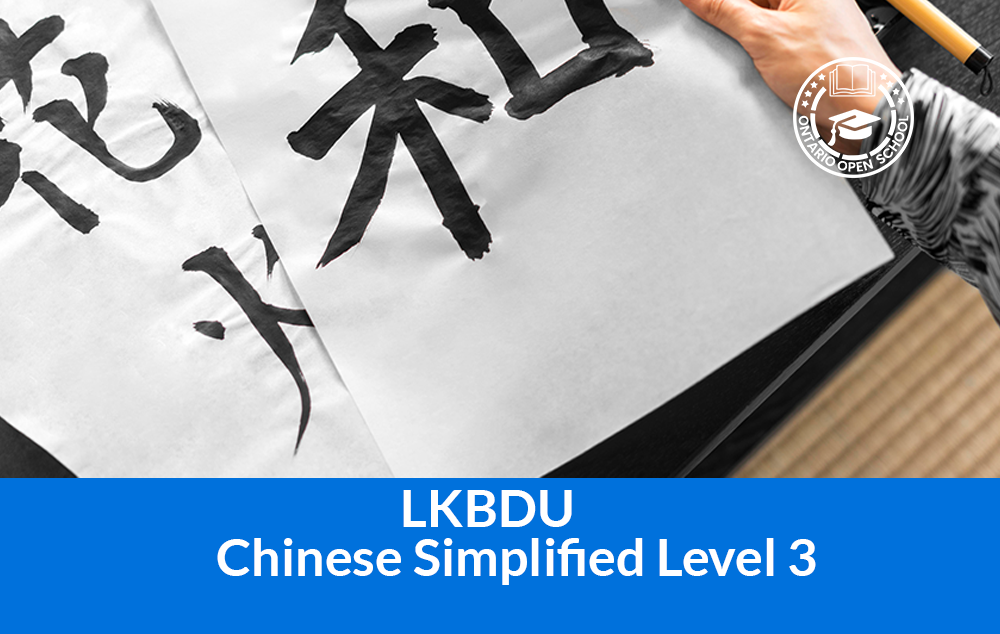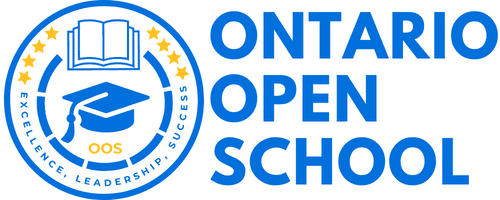- info@ontarioopenschool.com
- 647-494-4499
-
Unit 100 - 29 Gervais Drive, North York, ON.
M3C 1Y9
Copyright 2024 Ontario Open School Inc. All Rights Reserved.
Chinese Simplified – LKBDU course explores a broad range of themes and ideas expressed through poetry, novels, plays, and Chinese history. Students will engage with the texts and analyze them through a lens that allows them to connect literature and history to real life issues, and explore how these themes can span over centuries to still be a reflection on today’s society.
Unit Order | Unit Name | Suggested Time |
|---|---|---|
| Unit 1 | Chinese Culture and Modern Literatures By the end of this unit, students will: | 22 hours |
| Unit 2 | Chinese History and Poetry
| 28 hours |
| Unit 3 | Fortress Besieged ” WeiCheng ” by Zhongshu Qian By the end of this unit, students will: | 20 hours |
| Unit 4 | Play: Thunderstorm ” LeiYu ” by Yu Cao By the end of this unit, students will: | 16 hours |
| Unit 5 | Chapters of ” XuFuHui ” by Amy Tan By the end of this unit, students will: | 16 hours |
| Final Evaluation 30% | Final Assignment Final Exam | 6 hours 2 hours |
| Total | 110 Hours |
A wide variety of instructional strategies are used to provide learning opportunities to accommodate a variety of learning styles, interests and ability levels. These strategies include, but are not limited to:
In a conventional classroom, instructors employ a range of strategies for teaching a course:
In addition, teachers and students have at their disposal a number of tools that are unique to electronic learning environments:
All course material is online, no textbook or novels are required. Assignments are submitted electronically. The course ends in a final exam which the student writes under the supervision of a proctor approved by the school at a predetermined time and place. The final mark and report card are then forwarded to the student’s home school.
Students must achieve the Ministry of Education learning expectations of a course and complete 110 hours of planned learning activities, both online and offline, in order to earn a course credit.
The chart below indicates some general examples of online and offline activities.
| Online Learning Activities | Offline Learning Activities |
| Watching instructional videos | Reading materials for course |
| Watching additional resources videos | Studying instructional material |
| Completing online timed assignments | Practicing skills |
| Contributing to Forums | Completing assignments |
| Uploading video presentations | Completing essays |
| Communicating with instructor | Preparing presentations |
| Participating in live conferences | Reviewing for tests and exams |
| Practicing through online quizzes | Researching topics on internet |
| Reviewing peer submissions | |
| Assessing peer presentations | |
| Completing online timed exam |
Purpose
The primary purpose of assessment is to improve student learning. Assessment relates directly to the expectations for the course.
A variety of assessments for and as learning are conducted on a regular basis to allow ample opportunities for students to improve and ultimately demonstrate their full range of learning and for the teacher to gather information to provide feedback. Assessment tasks relate to the success criteria set out in lesson plans. Success criteria allow students to see what quality looks like.
Evaluation is the process of judging the quality of student work in relation to the achievement chart categories and criteria and assigning a percentage grade to represent that quality. Evaluation is based on gathering evidence of student achievement through:
Assessment for Learning – we provide feedback and coaching. Assessment FOR Learning is the process of seeking and interpreting evidence for the use of learners and their teachers to decide where the learners are in their learning, where they need to go, and how best to go there.
Assessment as Learning – we help students monitor progress, set goals, reflect on their learning
Assessment AS Learning is the process of the explicit fostering of students’ capacity over time to be their own best assessors, but teachers need to start by presenting and modeling external, structured opportunities for students to assess themselves.
Assessment of Learning – we use assessments to provide evaluative statements about student achievement. Assessment OF Learning is the assessment that becomes public and results in statements of symbols
(marks/grades/levels of achievement) about how well students are learning. It often contributes to pivotal decisions that will affect students’ future.
ASSESSMENT TOOLS
| Assessment as Learning | Assessment for Learning | Assessment of Learning |
| Students are asked to submit an assignment at the end of every lesson wherein they have an opportunity to put into practice the skills they have learned and demonstrate these skills to their instructor as part of their overall grade. There is a rubric available at the end of every unit in the assessment section to review which covers all of the expectations for the lesson assignments. | In all Units, students are expected to submit a mid-unit assignment directly to the instructor. The assignment provides a number of questions, problems, and activities balanced around the four categories of the Achievement Chart: Knowledge and Understanding, Thinking, Application, and Communication. The instructor grades each assignment and provides descriptive feedback, and the student is asked to provide feedback on the feedback. | Each Unit ends with an assignment that is submitted directly to the instructor. A grade is recorded based on the Learning Goals and Success Criteria for that Unit. Students may be asked to resubmit parts of the assignment, or a modified assignment. |
| Students will be asked to submit drafts to the instructor as well as post them on discussion forums. Feedback from both the instructor and the student can help the student advocate for their own learning. | The discussion forum is an area where students can engage in the learning and thinking process with each other, share ideas, reflect, and pool resources and strategies which will help in future assignments. | A Mid-Term Assignment and end of unit assessments ask students to synthesize their skills and knowledge in a culminating task that combines several units into one cohesive presentation. A grade is recorded, and the instructor can initiate a conversation with the student if there are concerns. |
| Instructors communicate with their students through email or live chat sessions. Students can raise concerns and reflect on their own personal goals and learning during these one to one conversations with their instructors. | At the end of the course, students complete a final exam that covers all the material studied in the course. |
Example of an Assessment Rubric for an Assignment in this course
|
LKBDU Unit 2 Lesson2 Assignment: Discussion Response Learning Goals · I will be able to identify correct writing conventions and errors in the work of mine and others. · I will be able to utilize writing conventions to write and proofread my work |
||||
| Success Criteria | Level | |||
| 1 | 2 | 3 | 4 | |
| I can use grammar conventions to correctly communicate my intended meaning clearly | ||||
| I can use punctuation correctly to communicate my intended meaning | ||||
| I can use knowledge of spelling rules and patterns, several different types of resources and appropriate strategies to spell familiar and new words correctly | ||||
| I can build vocabulary for writing by confirming word meanings and reviewing word choice | ||||
| I can use appropriate decoding strategies to read and understand unfamiliar words | ||||
| Teacher Feedback: | ||||
| Student Feedback: | ||||
Resources
Reference Texts
Note: This course is entirely online and does not require or rely on any textbook.
Growing Success: Assessment Evaluation and Reporting in Ontario Schools, First Edition Covering Grades 1-12
Grading
Weighting of categories
| Knowledge/Understanding | Thinking/Inquiry | Communication | Application |
| 25% | 25% | 25% | 25% |

Course Grade | Grade 12 |
|---|---|
Course Code | LKBDU |
Course Category | Classical Studies and International Languages |
Course Type | University Preparation |
Course Delivery | Online |
Course Duration | 110h |
Course Credit | 1.00 |
Copyright 2024 Ontario Open School Inc. All Rights Reserved.
